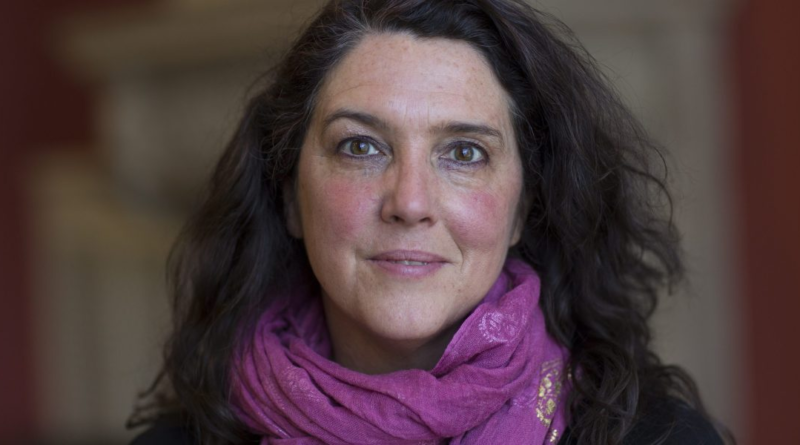Never apologize for double-packing and always buy a scarf and a pot of honey
Bettany Hughes has been a fixture on British television for more than two decades. The 56-year-old historian and TV presenter has a special expertise in ancient times and is a sought-after lecturer. She’s written several bestselling books, from her first—Helen of Troy: Goddess, Princess, Whore—to her most recent, The Seven Wonders of the Ancient World: An Extraordinary New Journey Through History’s Greatest Treasures, out on April 23.
Hughes lives in London but spends much of the year abroad, logging about 75,000 miles in the air. Her favorite carrier is Sri Lankan Airlines, a legacy from when she was shooting a show focusing on the ancient Buddhist world. “We had lots of delayed flights, and every time there was a delayed flight, they helped with a lovely pot of ginger tea in a silver teapot,” she says. “Even when I was flying economy, they looked after me.”
Here are some hard-earned hacks Hughes has picked up while trekking everywhere from the deserts of Turkey to the backwoods of Cambodia.
Never apologize for double-packing.
I always pack two suitcases, even if that means there’s excess to pay. They’ll have either identical things in each one, or almost a copy, sort of like mirror suitcases. It means if you lose one, you’ve still got enough clothes. I first traveled alone when I was 15. I hadn’t been abroad before, and I traveled by myself to Italy, to be in the Alps with someone I just met on the beach that summer.
I was so petrified of the idea of ending up there and being a kind of burden. That’s when I started the double-packing thing: two tiny, identical suitcases. I made a schoolgirl error last October, traveling to Trieste, Italy, to do a public lecture. “For once,” I thought, “I’m going to take one bag. What could go wrong?” And Lufthansa lost it. It meant I was stuck without my makeup, my clothes. It did turn up four or five weeks later, but I’d learned my lesson.
Try these two tricks if you’re worried about creepy-crawlies.
When I was researching not just Angkor Wat but also Angkor Thom—which is behind Angkor Wat, and a bit more remote—I was really going out into the wild, where the tree roots are kind of thigh-high and you’re hacking your way through the bushes. I had a guide with me, and I admitted that the only two things I’m scared of in life are the dark and snakes. He said, “Don’t worry, look what I’ve got in my pocket.” It was a lemon. He said, “I promise you won’t get bitten.”
Whether that’s true or not, I now always carry at least a slice with me at all times. It does mean at the end of big travels I often end up with a slightly shriveled slice of lemon in my pocket. I also wear Clarks desert boots, which go just high enough up your leg that you’re not going to get bitten. They’re just above ankle-snakebite level.
Want an insider’s guide to Athens or Istanbul? This is the need-to-know.
The way to experience Istanbul is by boat, because the city is laced with waters. You can get on a ferry that goes from one end of the Bosporus to another or across it, that classic thing: Travel from Asia to Europe for less than a dollar on a ferry. And go to Athens and walk down Adrianou Street, which is the main pedestrian street, and look left. You’ll actually see the Oath Stone where Socrates was tried. Also on the other side, almost directly opposite, is the painted stoa where we get the word “Stoics” from.
Follow this protocol anytime you plan to take pictures.
Never forget you’re a guest in someone else’s country. That’s always my position when you arrive: You are a guest, and you are lucky to be there and need to earn the respect of your host. Whatever you’re filming with, whether it’s a camera or an iPhone or whatever, respect the place and make sure you’ve got permission.
And I don’t mean legal permission, but buy-in from the people you’re with. Make eye contact, make friends. Always say, “Is it OK if I take a photo?” I was filming on the Jordanian-Lebanese border, and we sat down in a cafe that was full of Hezbollah. We didn’t realize that, and it could’ve been very sticky. But the fact that we took the time to explain what we were doing—that I was doing something on the history of Mars, the god of war—we were allowed to proceed. If we’d just barreled up and taken over, without taking the time, it could’ve ended very badly.
Go here for an alternative to the overcrowded excavations of Pompeii.
The Turkish-Syrian border has some of the richest archaeology, spanning 12,000 years of human history. There’s a place called Zeugma, an ancient city that was occupied by the Romans, initiated just after the time of Alexander the Great, and an incredibly rich border town. It was on the border of what was then the Persian Empire. The level of detail of the mosaics that have been discovered there are just extraordinary; there are levels of preservation that are as good as Pompeii.
A quick way to sense-check the safety of a new place? Rely on animal instinct.
I do a “stray pet check” when I land somewhere I’ve not been before. I always check out how friendly the dogs and cats are. If they’re cowering, then you know people don’t treat them well, and you need to have your wits about you. If the dogs are incredibly friendly, then that’s a good sign, because it shows people are being kind to them. I’ve just come back from Georgia, in the Caucuses, and I can’t tell you how friendly the dogs were. They were like emotional support dogs.
Two worthwhile souvenirs to buy in every destination.
Wherever I’ve traveled in the world, I will always buy a scarf and a pot of honey. If anybody knows my programs, I always have basically a suitcase full of scarves. I found that wherever you travel, they’re a sunshade, they can wipe sweat, they can keep you warm, and they can work as a tourniquet if you get into trouble. So I have this extraordinary selection of scarves that I carry with me, from Indian bazaars, souks in Istanbul, Albanian villages. They’re definitely not Hermès, but they have their own authenticity and honesty to them.
And I have an archaeological collection of honey in my kitchen—a whole side wall. I’ve come back with saffron honey from Azerbaijan. As an historian, I know that honey lasts sometimes for centuries. I’m still never in my lifetime going to get through the supplies of honey that I’ve got, because I literally bring them back from every single location I’ve been to.
Two Greek islands worth a special trip.
I love the Greek islands. You expect them to be amazing, but Icaria is so beautiful. It’s where Icarus supposedly died when he fell to the ground, and it’s almost completely unspoiled. There are freshwater springs; there aren’t many cars. There’s a man called the Odysseus of Honey who travels around by boats getting fresh honey from the bees. It’s a pretty dreamy island. And go to Naxos, another Greek island, where a lot of the marble came from to build the Greek sculptures. But there they were quarrying out a sculpture, probably Dionysus or Bacchus, the god of wine, and stopped midflow in the side of the mountain—a half-finished statue. You can still see the chisel marks.




